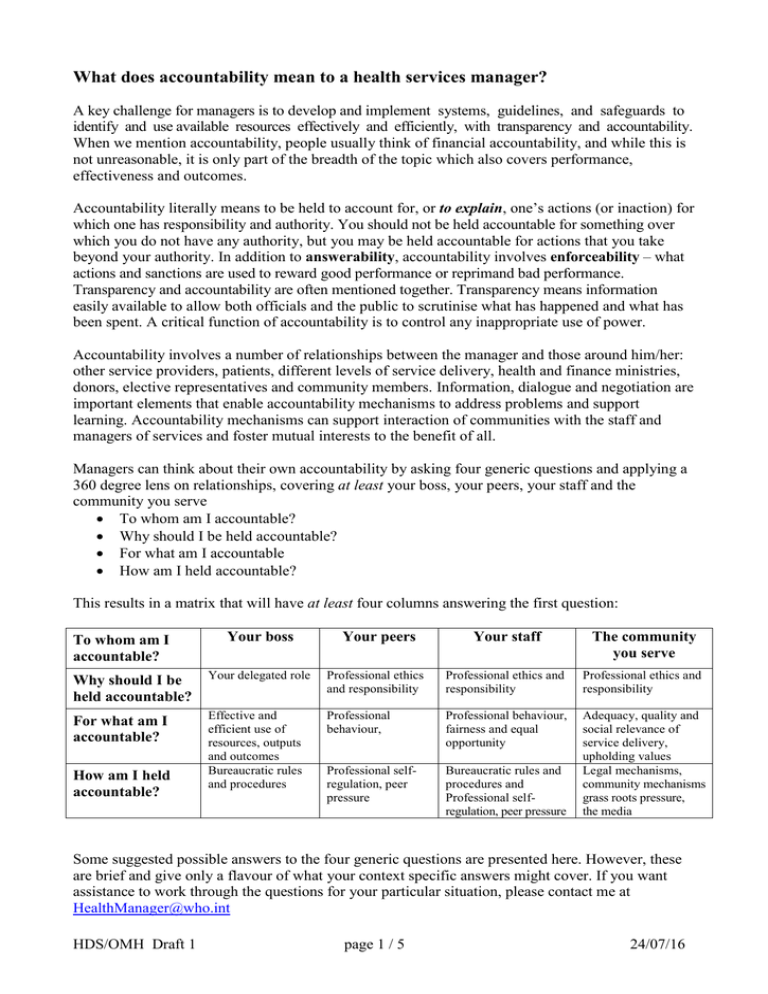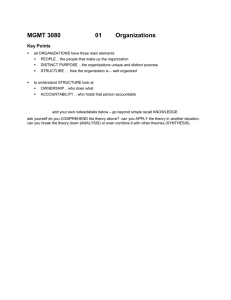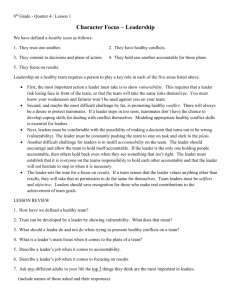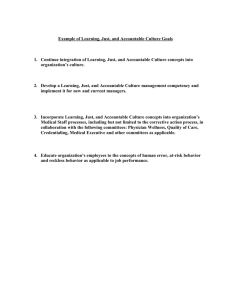What does accountability mean to a health services manager?
advertisement

What does accountability mean to a health services manager? A key challenge for managers is to develop and implement systems, guidelines, and safeguards to identify and use available resources effectively and efficiently, with transparency and accountability. When we mention accountability, people usually think of financial accountability, and while this is not unreasonable, it is only part of the breadth of the topic which also covers performance, effectiveness and outcomes. Accountability literally means to be held to account for, or to explain, one’s actions (or inaction) for which one has responsibility and authority. You should not be held accountable for something over which you do not have any authority, but you may be held accountable for actions that you take beyond your authority. In addition to answerability, accountability involves enforceability – what actions and sanctions are used to reward good performance or reprimand bad performance. Transparency and accountability are often mentioned together. Transparency means information easily available to allow both officials and the public to scrutinise what has happened and what has been spent. A critical function of accountability is to control any inappropriate use of power. Accountability involves a number of relationships between the manager and those around him/her: other service providers, patients, different levels of service delivery, health and finance ministries, donors, elective representatives and community members. Information, dialogue and negotiation are important elements that enable accountability mechanisms to address problems and support learning. Accountability mechanisms can support interaction of communities with the staff and managers of services and foster mutual interests to the benefit of all. Managers can think about their own accountability by asking four generic questions and applying a 360 degree lens on relationships, covering at least your boss, your peers, your staff and the community you serve To whom am I accountable? Why should I be held accountable? For what am I accountable How am I held accountable? This results in a matrix that will have at least four columns answering the first question: To whom am I accountable? Your boss Your peers Your staff The community you serve Why should I be held accountable? Your delegated role Professional ethics and responsibility Professional ethics and responsibility Professional ethics and responsibility For what am I accountable? Effective and efficient use of resources, outputs and outcomes Bureaucratic rules and procedures Professional behaviour, Professional behaviour, fairness and equal opportunity Professional selfregulation, peer pressure Bureaucratic rules and procedures and Professional selfregulation, peer pressure Adequacy, quality and social relevance of service delivery, upholding values Legal mechanisms, community mechanisms grass roots pressure, the media How am I held accountable? Some suggested possible answers to the four generic questions are presented here. However, these are brief and give only a flavour of what your context specific answers might cover. If you want assistance to work through the questions for your particular situation, please contact me at HealthManager@who.int HDS/OMH Draft 1 page 1 / 5 24/07/16 To whom am I accountable? The basic answer to this question is anyone who is influenced by your actions or on whom your actions have a direct or indirect impact. The relationships identified through a 360 degree lens are often referred to in the literature as directional accountability: upwards (to your boss and above), horizontal (to your peers) and downwards (to the community). Other terms sometimes used are internal (to your boss, colleagues and staff) and external (to the community, judicial system and professional organizations). Don’t worry about particular names, but do realize that when thinking about accountability, you need to think about a wide range of people. You may have several layers of “boss” or higher authority to whom you report, and this may include donors. You carry out work on behalf or your boss and the way you do your job impacts on the reputation of your boss. The way you do your job also influences the work of other managers in your district or institution – if you do your job well, you can help make their job easier, and if you don’t……. Your peers might include professional organizations to which you belong, and thus represent. Again, your actions will reflect on that organization. One of your responsibilities is to assist your staff to do their job well and to treat them fairly and with respect. Certainly the way you behave as a manager impacts on their performance, for example, staff who have little say over how their work is organised can protest by frequently calling in sick, working slowly, going on leave or other passive resistance. The ultimate reason for your work is to provide health services for a catchment community. This may require your special attention to particular groups, such as the very young or very poor. You will quickly see that there are close inter-relationships between the answers to the other three questions related to each group of people on whom your actions impact. Why should I be held accountable? Reasons for being held accountable include the requirements of the position you hold, the use of public money, professional ethics and responsibility, human rights, moral correctness, fairness, impartiality and the importance of equity in service delivery and health outcomes. The purpose of accountability is to both prevent errors (responsiveness in planning before implementation) and to detect errors (during and after implementation) in order to improve future services. Your position as a manager, for which you are paid, requires that you implement policies, undertake functions and meet targets. Public money is obtained by tax or fees from members of the public – money that is in fact theirs and which you have been given the privilege and responsibility of using wisely on their behalf to provide services that meet their needs. If this money is not spent well, then community members do not receive as much help as they should have. Accountability mechanisms aim to prevent fraudulent use of funds. Corruption in the use of public money exacerbates poverty. As with clinical professions, managers have professional responsibility to work in order to the best possible. The Hippocratic Oath, traditionally taken by physicians, pertains to the ethical practice of medicine, making doctors honour-bound, within their ability and judgement, to “never do harm to anyone”. Staff and patients have basic human rights enshrined in international covenants and your country’s constitution. They have the right to be treated fairly, and not to suffer from others receiving favouritism. For example, where user fees are charged, allowing people to avoid paying fees when they can afford to pay places a higher financial burden on others, especially the very poor, and reduces equity. Allowing the very poor to be exempt from fees has been shown to be beneficial for all the community and enhances equity. HDS/OMH Draft 1 page 2 / 5 24/07/16 For what am I accountable? You are accountable for your actions and for your areas of responsibility and authority. Within your sphere of authority, you are accountable for the use of inputs (funds, staff, information, supplies and other resources), for processes, procedures and standards, and for the resulting outputs and outcomes. You are accountable for carrying out all parts of your role to the best of your ability, with integrity and conscientiously to all standards and guidelines provided by your boss or expected by your professional organizations. You are accountable for upholding internationally accepted values, the values, rules and standards of your health service delivery organization and your professional organizations. These are likely to relate to human and civil rights, gender mainstreaming, rights of the child, integrity, equity, fairness and avoiding discrimination. You are accountable for preparing and implementing a plan toward achieving your organization’s health service delivery mission, policies and targets. Many of these will relate to local or national government health policies and targets. Even if you are working in the private sector, these are likely to impact on your management decisions. You are accountable for using all funds and resources most appropriately and eliminating corruption. You are accountable for assisting colleagues, supporting and training staff and using knowledge gained in training wisely. You are accountable for facilitating community consultation and participation, and ensuring that the community receives a suitable range of services that meet their needs at satisfactory standards and promoting equity. The constitution or citizen or patient charters are means of defining what the community and patients may reasonably expect, for example, the right to participate in developing the health plan and proposed expenditure and to have access to this information once finalised; the right to information on health interventions delivered and actual expenditures. District and hospital managers may be responsible for ensuring that this information is made available to the community in a suitable and comprehensible format. Accountability is enhanced when the funding information relates to policies and programmes as well as to particular groups, for example how much spent on child health care, or for the very poor. How am I held accountable? In general, you are held accountable by being required to provide information and/or to answer questions about your actions or lack of action. In addition, means of enforceability may be applied. You can be held accountable related to regulations and legislation covering your functions and areas of responsibility and authority. Your boss holds you to account through supervision and performance assessment and by requiring you to regularly and periodically report on your activities, expenditure, service delivery and indicators related to targets. Internal and external audits are a means of assessing financial accountability and integrity. Increasingly, audits also examine performance in relation to financial expenditure. Ultimately, your boss can remove you from post if performance is inadequate, or give you a bonus, raise or promotion if performance is good. Your peers are likely to hold you to account through peer review, questioning you in person or at meetings. Your professional organization can expect you to explain your actions if they receive a complaint about your performance, and if not satisfied, can expel you from the organization. Your staff are likely to ask questions in private or at meetings. Staff might also use a representative to speak with you if they are experiencing problems. Most staff performance systems give staff an opportunity to comment on their assessment or on the treatment they have received. HDS/OMH Draft 1 page 3 / 5 24/07/16 The community can hold you to account through community leaders, representatives on local health management boars, local politicians and the media. Community members can ask questions at public meetings or through the media, demand access to information, demand investigations where there are problems, and participate in monitoring and evaluation procedures. Community members also hold managers to account by not using services that do not meet their needs or are not of satisfactory standard. In Oruru, Bolivia, a community health information system was developed. This led to better appreciation of maternal and child health issues and communities set priorities for community actions, accessed resources and evaluated progress. This encouraged community members to express their concerns to hospital staff: Why was the hospital still charging for consultations when the newspapers and radio had announced that the national health insurance covered children under five and pregnant women? The nurse explained that since the mayor had not reimbursed the hospital for its costs, the hospital was forced to charge for the services it provided. Community leaders met with the mayor to insist that he pay what was owed to the hospital so that priority services could be free of charge as the government had stipulated. In this way, the communities and health workers worked together to demand accountability. Asha George, 2005 HDS/OMH Draft 1 page 4 / 5 24/07/16 Accountability Worksheet Management Role: Management Context: To whom am I accountable? Your boss Your peers Your staff The community you serve Why should I be held accountable? For what am I accountable? How am I held accountable? HDS/OMH Draft 1 page 5 / 5 24/07/16




